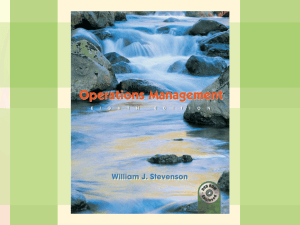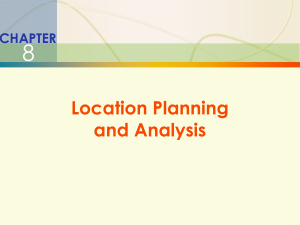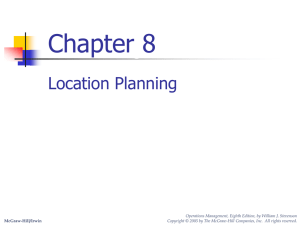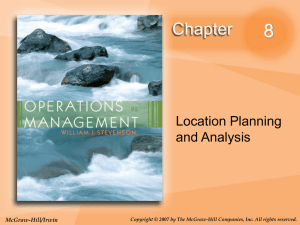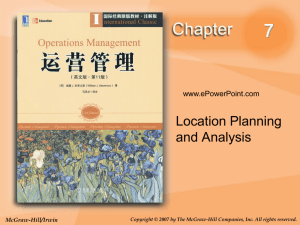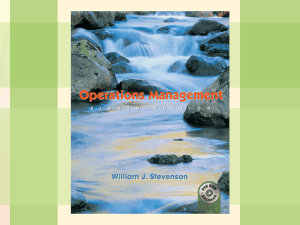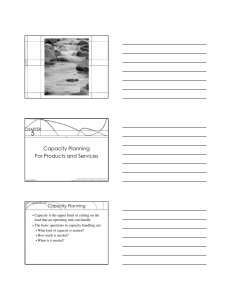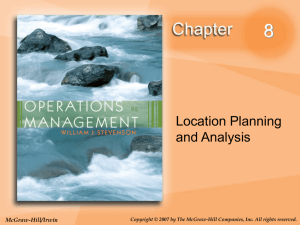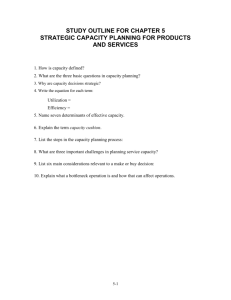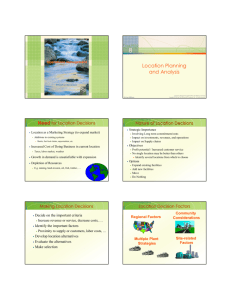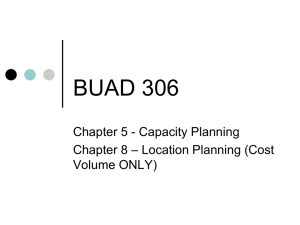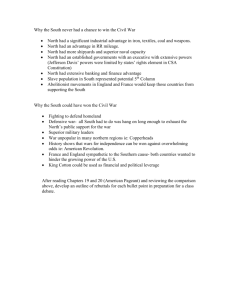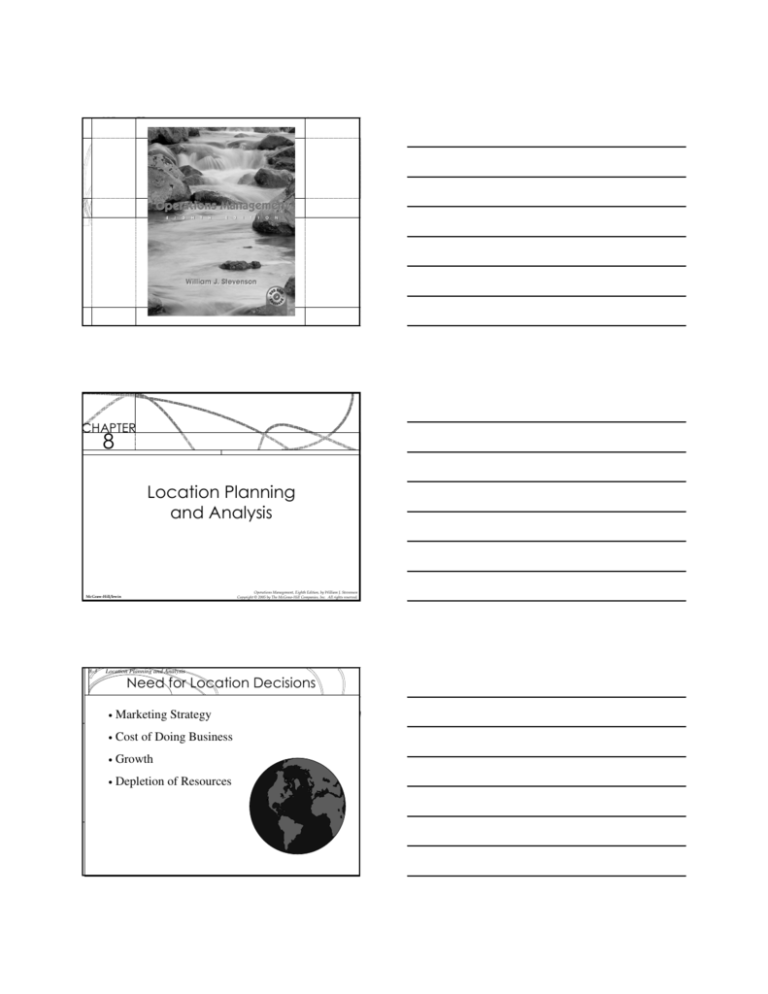
8-1
Location Planning and Analysis
Operations Management
William J. Stevenson
8th edition
8-2
Location Planning and Analysis
CHAPTER
8
Location Planning
and Analysis
Operations Management, Eighth Edition, by William J. Stevenson
Copyright © 2005 by The McGraw-Hill Companies, Inc. All rights reserved.
McGraw-Hill/Irwin
8-3
Location Planning and Analysis
Need for Location Decisions
•
Marketing Strategy
•
Cost of Doing Business
•
Growth
•
Depletion of Resources
8-4
Location Planning and Analysis
Nature of Location Decisions
•
Strategic Importance
•
•
•
•
Objectives
•
•
•
•
Profit potential
No single location may be better than others
Identify several locations from which to choose
Options
•
•
•
8-5
Long term commitment/costs
Impact on investments, revenues, and operations
Supply chains
Expand existing facilities
Add new facilities
Move
Location Planning and Analysis
Making Location Decisions
Decide on the criteria
Identify the important factors
• Develop location alternatives
• Evaluate the alternatives
• Make selection
•
•
8-6
Location Planning and Analysis
Location Decision Factors
Regional Factors
Community
Considerations
Multiple Plant
Strategies
Site-related
Factors
8-7
Location Planning and Analysis
Regional Factors
Location of raw materials
• Location of markets
• Labor factors
• Climate and taxes
•
8-8
Location Planning and Analysis
Community Considerations
Quality of life
Services
• Attitudes
• Taxes
• Environmental regulations
• Utilities
• Developer support
•
•
8-9
Location Planning and Analysis
Site Related Factors
Land
Transportation
• Environmental
• Legal
•
•
8-10 Location Planning and Analysis
Multiple Plant Strategies
Product plant strategy
• Market area plant strategy
• Process plant strategy
•
8-11 Location Planning and Analysis
Table 8.2
Comparison of Service and
Manufacturing Considerations
Manufacturing/Distribution
Service/Retail
Cost Focus
Revenue focus
Transportation modes/costs
Demographics: age,income,etc
Energy availability, costs
Population/drawing area
Labor cost/availability/skills
Competition
Building/leasing costs
Traffic volume/patterns
Customer access/parking
8-12 Location Planning and Analysis
Trends in Locations
•
Foreign producers locating in U.S.
•
•
•
•
•
“Made in USA”
Currency fluctuations
Just-in-time manufacturing techniques
Microfactories
Information Technology
8-13 Location Planning and Analysis
Table 8.3
Foreign
Government
Cultural
Differences
a. Policies on foreign ownership of production facilities
Local Content
Import restrictions
Currency restrictions
Environmental regulations
Local product standards
b. Stability issues
Living circumstances for foreign workers / dependents
Religious holidays/traditions
Customer
Preferences
Possible buy locally sentiment
Labor
Level of training and education of workers
Work practices
Possible regulations limiting number of foreign employees
Language differences
Availability and quality of raw materials, energy,
transportation
Resources
8-14 Location Planning and Analysis
Evaluating Locations
•
Cost-Profit-Volume Analysis
•
Determine fixed and variable costs
•
Plot total costs
•
Determine lowest total costs
8-15 Location Planning and Analysis
Location Cost-Volume Analysis
•
Assumptions
Fixed costs are constant
Variable costs are linear
• Output can be closely estimated
• Only one product involved
•
•
8-16 Location Planning and Analysis
Example 1: Cost-Volume Analysis
Fixed and variable costs for
four potential locations
L o c a tio n
F ix e d
C ost
$ 2 5 0 ,0 0
1 0 0 ,0 0
1 5 0 ,0 0
2 0 0 ,0 0
A
B
C
D
V a r ia b le
C ost
$11
30
20
35
0
0
0
0
8-17 Location Planning and Analysis
Example 1: Solution
Fixed
Costs
A
B
C
D
$250,000
100,000
150,000
200,000
Variable
Costs
Total
Costs
$11(10,000)
30(10,000)
20(10,000)
35(10,000)
$360,000
400,000
350,000
550,000
8-18 Location Planning and Analysis
Example 1: Solution
$(000)
800
700
600
500
400
300
200
100
0
0
D
B
C
A
A Superior
C Superior
B Superior
2
4
6
8
10
Annual Output (000)
12
14
16
8-19 Location Planning and Analysis
Evaluating Locations
•
Transportation Model
•
•
Factor Rating
•
•
Decision based on movement costs of raw
materials or finished goods
Decision based on quantitative and qualitative
inputs
Center of Gravity Method
•
Decision based on minimum distribution costs

